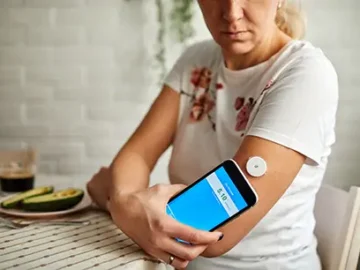The facts about this common condition might surprise you.
Has a well-meaning friend or relative ever warned you about eating too much candy in one sitting “because you’ll get diabetes”?
And did you believe them?
Diabetes is a fairly common condition. But that doesn’t mean we know all the facts.
There are a lot of myths surrounding diabetes. Knowing the truth is important for treatment and prevention — which isn’t always possible. There may be genetic factors at play, too, depending upon which type of diabetes you have.
Those types are key to understanding the disease. So, before we tackle the facts and the fiction, let’s look at the two most common types of diabetes.
Type 1 and Type 2: What’s the difference?
Put simply, when you have diabetes, your body can’t regulate your blood sugar (glucose) levels well. This happens either because your pancreas has stopped producing enough insulin or your cells have become resistant to insulin — or both.
Insulin is the hormone that moves sugar out of your bloodstream and into your cells. If that system isn’t working, your blood glucose levels will stay too high. This can lead to symptoms ranging from a sluggish feeling and thirst to more serious complications such as nerve damage, stroke or heart disease.
The two most common types of diabetes are:
- Type 1: The body’s immune system starts attacking the cells that produce insulin, and eventually production stops. People with Type 1 diabetes need daily insulin injections or an insulin pump.
- Type 2: The body may still produce insulin, but the cells resist it. Sometimes the body doesn’t make enough insulin. You have a greater chance of developing Type 2 diabetes if you’re overweight and have a family history of diabetes.
1 – Myth or fact? You can get diabetes from eating too much sugar.
The answer is a bit complicated.
You don’t get Type 1 diabetes because you made poor food choices. It’s an autoimmune disorder. And eating even a big bag of candy just once won’t give you Type 2 diabetes, either.
But over time, an unhealthy diet and obesity can contribute to the development of Type 2 diabetes. In fact, diet and exercise may be enough to control Type 2 diabetes in its early stages. Losing even a small percentage of weight can start to impact how your body handles insulin, for the better.
“Maintaining a healthy diet and exercising are always good ideas,” says Cortese. “But establishing and maintaining a healthy weight are especially important for those who are at risk of developing or who’ve been diagnosed with Type 2 diabetes.”
2 – Myth or fact? People with diabetes prick their fingers all the time.
People with Type 2 diabetes who take insulin and some other diabetes medications do need to check their blood sugar, and “finger prick” glucose meters are still popular. But some newer technologies, such as continuous glucose monitors (CGMs), don’t require a blood sample. Instead, CGMs are inserted under the skin and measure glucose found in fluid between your cells.
If you have Type 2 diabetes, you may also need to check your blood sugar if your medication changes or if you have fluctuations in your levels. And your care team might use testing to figure out how certain foods and exercise affect your blood sugar.
3 – Myth or fact? People with diabetes need to eat special food.
“People managing diabetes should eat healthy food,” says Cortese. “But they don’t need to buy special food labeled ‘diabetes friendly.’ Those products might be more expensive and may still raise blood glucose levels.”
A good diet for those managing diabetes will include plenty of non-starchy vegetables, whole grains, lean proteins, heart-healthy fats and healthy portions of whole fruits — the same nutritious foods everyone should be eating.
4 – Myth or fact? Diabetes can be cured.
There’s no “cure” for Type 1 or Type 2 diabetes, only ways to control them. However, if diagnosed early and managed well enough, Type 2 diabetes may go into remission. And it may last for a long time.
“That’s why early diagnosis of Type 2 diabetes — and careful management — are so crucial,” says Cortese. “Remission becomes less likely over time. If you have any concerns, see your healthcare team right away.”
She adds, “Of course, prevention of Type 2 diabetes is always the best option. Ask your provider about proper nutrition and exercise, no matter where you are in your health journey.”












